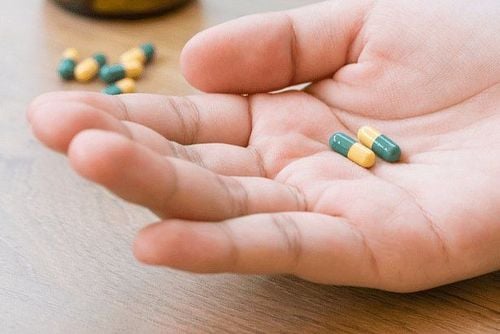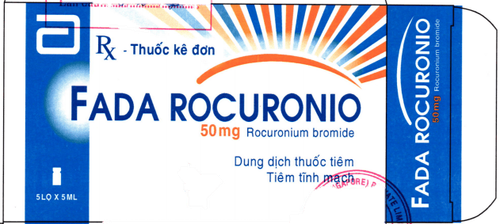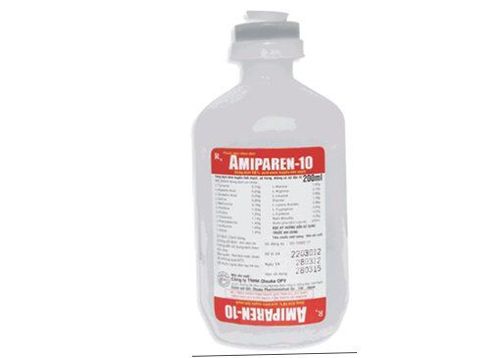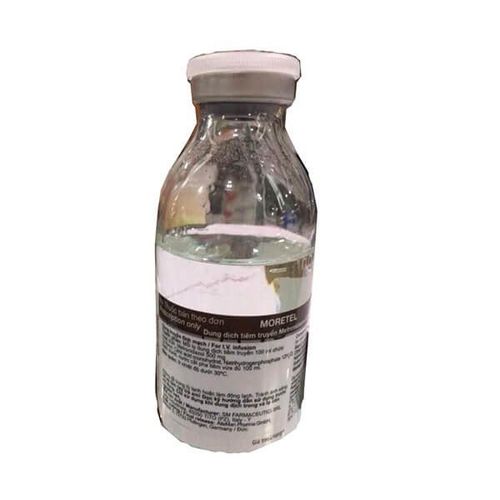This is an automatically translated article.
The drug Acrium belongs to the group of drugs that relax the muscles and increase muscle tone, used in surgery. So how is Acrium used? And who should take Acrium?
1. What is Acrium?
Acrium medicine contains the main ingredient Atracurium 10mg/ml and excipients just enough provided by the manufacturer.
Dosage form: Solution for infusion.
Packing form: Box of 5 tubes x 2.5ml.
2. What does Acrium do?
Acrium is indicated in the following cases:
Support in anesthesia intubation. Helps relax muscles during surgery or during mechanical ventilation. Besides, Acrium drug is contraindicated for treatment in case the patient has a history or suspected allergy to the active ingredient Atracurium or other excipients in the composition of the drug.
3. Dosage and how to use Acrium
The drug is prepared in the form of an infusion solution, which can be used for intravenous injection or mixed with other solutions for intravenous infusion depending on the doctor's prescription.
The following is the recommended dose of Acrium:
Adults:
Intravenous use:
The usual recommended dose of Acrium: from 0.3-0.6mg/kg (depending on the duration of total inhibition). sets required) and will cause muscle relaxation for 15-35 minutes. Intubation can usually be performed 90 seconds after intravenous administration at a dose of 0.5-0.6 mg/kg. When necessary, neuromuscular blockade persists with the addition of 0.1-0.2 mg/kg. Consecutive administration of doses does not result in a cumulative neuromuscular blockade. Spontaneous recovery at the end of the suppression phase occurs approximately 35 min after the recovery of muscle contraction to 95% of normal muscle function. The neuromuscular blockade of Acrium can be reversed with standard doses of Linesterase agents, such as Neostigmin or Pyridostigmine, in combination with Atropin. Intravenous use:
Acrium rapid injection starts at a dose of 0.3-0.6mg/kg. Neuromuscular blockade can be maintained during prolonged surgery by continuous intravenous infusion at a rate of 0.3-0.6 mg/kg/hour. In cardiopulmonary bypass surgery with an infusion rate of 0.3-0.6 mg/kg/hour. Hypothermia to 25-26°C reduces the rate of inactivation of Acrium, and thus total neuromuscular blockade can be maintained at about half the rate of infusion. initial hypothermia. Stored at 30 degrees Celsius, the stability of Acrium diluted 0.5mg/ml with solutions such as sodium lactate (4 hours), sodium chloride 0.18% (8 hours), glucose 4% (8 hours) hours), Glucose 5% (8 hours), Sodium chloride 0.9% (24 hours). Intravenous use:
Children: Dosage (mg/kg) for children over 1 month of age is the same as the adult dose based on body weight.
Elderly: The standard dose can be used in elderly patients. However, the lowest starting dose within the recommended dose range should be used and injected slowly.
Patients with impaired renal or hepatic function : Standard doses can be used in varying degrees of renal or hepatic impairment, even in the end stage
Cardiovascular diseases: Patients with severe cardiovascular disease, The initial dose should be given slowly over 60 seconds.
4. Side effects of Acrium
Before prescribing, doctors always weigh the benefits of Acrium's effectiveness more than the risk of side effects. However, some cases when using Acrium may still occur undesirable effects such as:
Skin: Skin irritation, rash, urticaria, skin flushing, injection site reactions. Respiratory: Arrhythmia, bronchospasm, wheezing. Cardiovascular: Hypotension, hypertension, vasodilation, tachycardia, bradycardia, hypoxemia, convulsions.
5. Acrium drug interactions
Please list and inform your doctor about all the medicines you are taking to avoid possible interactions when taking different drugs together.
The muscle relaxant effect of Acrium may interact with the following drugs:
Aerosol anesthetics such as: Halothan, Enfluran, Isofluran. Antibiotics such as: Aminoglycosides, Polypeptides, Spectinomycin, Tetracycline, Lincomycin, Clindamycin and Vancomycin. Antiarrhythmic drugs: Lidocaine, Procainamide, Quinidine. Beta-blockers: Propranolol. Calcium channel blockers: Verapamil. Diuretics: Furosemide, Thiazide, Acetazolamide and Mannitol. Drugs that inhibit ganglia: Trimethaphan, Hexamethonium. Other drugs: Magnesium sulphate, Ketamine, Lithium salts. Do not use in combination with muscle relaxants (such as Suxamethonium chloride) because it can cause prolonged muscle block.
Acrium may have long acting and shorter duration of action in patients receiving chronic anticonvulsants such as Carbamazepine, Phenytoin.
When used in combination with other muscle relaxants, synergistic or antagonistic interactions may occur and should be considered.
6. Some notes when taking Acrium
Here are some notes when taking Acrium to help achieve its effectiveness and reduce the risk of side effects:
The drug should be used with caution in patients with medical conditions such as: Severe myasthenia gravis (Lambert-Eaton myasthenic syndrome) and other neuromuscular disorders, severe acid-base metabolism or electrolyte disturbances, systemic metastatic cancer, hypophosphataemia, bronchial asthma, burns, cardiovascular disease . Acrium should not be administered to pregnant women because of evidence of teratogenicity, unless the benefits to the mother outweigh the risks to the fetus. Acrium is suitable for maintaining muscle relaxation during cesarean section, since very small amounts cross the placenta, caution should be exercised after surgery because of the potential for neonatal respiratory distress. The drug has a muscle relaxant effect, so caution should be exercised when driving and operating machinery.
7. What to do in case of an overdose of Acrium?
In case of overdose, the patient may experience the following symptoms and treatment:
Severe muscle paralysis and its consequences are the main signs. Increased risk of histamine release and cardiovascular side effects, especially high blood pressure. Supportive treatment of cardiovascular symptoms such as intravenous fluids and use of antihypertensive agents if necessary. The airway should be maintained until spontaneous respiration is responded to and used in combination with anticholinergics such as atropin. Above is the important information of Acrium drug, carefully reading the instructions before use and strictly following the doctor's instructions will help patients use the drug effectively and safely.
Please dial HOTLINE for more information or register for an appointment HERE. Download MyVinmec app to make appointments faster and to manage your bookings easily.













